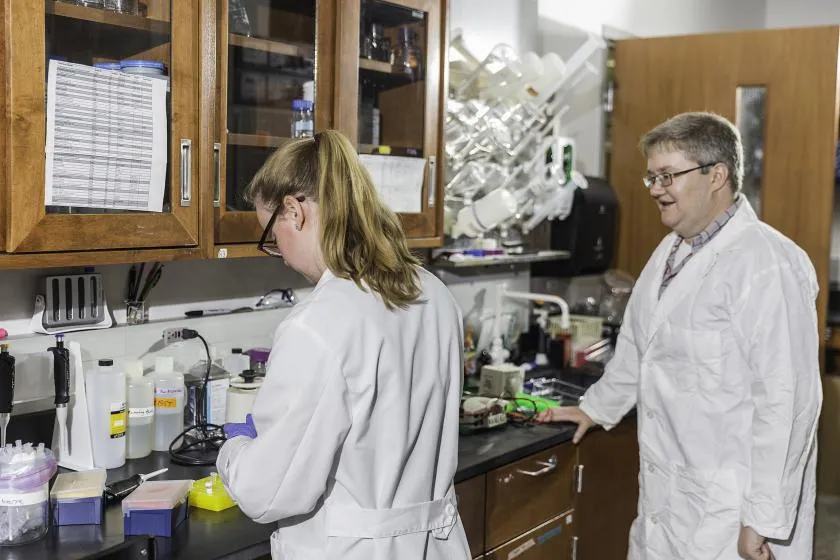Northern Michigan University Biology Associate Professor Josh Sharp is the recipient of a 2021-22 NMU Excellence in Scholarship Award. The award gives special consideration to faculty who involve students in their research and creative activities, which Sharp does on a regular basis, supervising students in his lab.
“An important aspect of my job is to help bring unique, high-quality learning opportunities to NMU so that our students get the best training we can provide,” he said. “Undergraduate and graduate research experiences are critically important for the professional development of our students. These experiences are so valuable in the preparation of our students for their future careers and/or entrance into professional/graduate schools.
“The Covid monitoring project, for example, not only allows students to utilize new technologies and gain marketable skills in molecular biology, but they also get to see how lab science interfaces with public health in a real and impactful way.”
Sharp, four undergraduate students and a technician monitored Marquette wastewater for the virus that causes COVID-19 as part of a statewide $10 million pilot program, applying the same methods they have used to test beach water for E. coli.
The SARS-CoV-2 virus is shed in human waste, including from people who are asymptomatic or have not yet become ill. It can be detected by testing samples taken from sewers and wastewater treatment plants, with results often available earlier than those from human clinical samples. These results could be used to inform local public health actions to prevent further spread within that community.
During the pilot from October through December 2020, Sharp and his team used real-time Polymerase Chain Reaction (PCR), a molecular microbiology technique that amplifies targeted DNA molecules.
State funding for the COVID monitoring project enabled Sharp to purchase a more sophisticated version of that instrument. Digital droplet PCR (ddPCR) is more sensitive than conventional PCR and allows for easier quantitation of viral levels in a specific sample. The technology can be used in the future to detect other microbial pathogens and even cancer mutations.
According to the Celebration of Excellence program, Sharp's lab also researches Pseudomonas aeruginosa, which was the focus of his postdoctoral work. These bacteria normally live in soil/water, but can infect the lungs of children with cystic fibrosis, burn patients and skin wounds, and also contaminate medical devices.
“There is such a great diversity of high-quality research and scholarship on our campus,” he said in response to being recognized for his scholarship. “I feel honored to be recognized by my colleagues with this award.”
Sharp joined the NMU faculty in 2012. He teaches courses in medical microbiology, virology, immunology and microbial pathogenesis.

